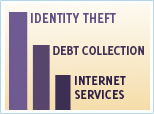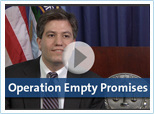 |
2010 Consumer Complaints Catalogued
 |
For the 11th consecutive year, identity theft was at the top of the list of complaints
consumers submitted to the FTC. Of the more than 1.3 million complaints received by the agency in 2010, 19 percent were related to ID theft. A total of 11 percent of the complaints — nearly 145,000 — dealt with debt collection; some five percent dealt with internet services. For the first time, imposter scams — where fraudsters pose as friends, family, or government agents to trick people into sending them money — made the top 10. The new FTC report also includes complaint data by state, and data about the 50 metropolitan areas reporting the highest per capita incidence of complaints.
|
Empty Promises Exposed
 |
As part of Operation Empty Promises, the FTC, the U.S. Department of Justice, the U.S. Postal Inspection Service, and several states announced more than 90 law enforcement actions against companies promising online business opportunities, steady and lucrative employment, and successful home businesses. According to the FTC, the cases run the gamut of business opportunity fraud: one company sold worthless internet business coaching; one claimed to offer roles as TV and movie extras; yet another sold services that were supposed to help people recover money they'd already lost to other business opportunity and work-at-home scammers. Estimates of consumer losses were more than $60 million. Before you buy a business opportunity, check out ftc.gov/bizopps. |
Refunds Help Right Wrongs
 |
In the last month, the FTC mailed over 1,400 refund checks totaling $1.25 million to consumers defrauded by a mortgage foreclosure rescue scam, and sent out claim forms to 11,780 people defrauded by illegal auto warranty robocalls. In the first case, the court found that homeowners got few, if any, loan modifications; indeed, many people lost their homes to foreclosure rescue scams after paying up to $5,500 for help. In the second, the FTC alleged that Transcontinental Warranty, Inc., hired a telemarketing company that made millions of deceptive prerecorded calls.
|
The Buck Stops Here
 |
The FTC announced settlements with three credit report resellers whose alleged security failures allowed hackers to access sensitive information. The agency charged that the resellers failed to take reasonable steps to protect people's personal information; they allowed clients that didn't use basic security measures — like firewalls and updated antivirus software — to access credit reports online. As a result, the hackers were able to break into the system and access more than 1,800 credit reports. The FTC alleged that even after learning about the data breaches, the resellers failed to take reasonable steps to protect against them in the future. The settlements require the resellers to strengthen their data security procedures and submit to audits for 20 years.
|
Taboo Texting
 |
The FTC has asked a federal judge to shut down a telemarketing outfit for violating the FTC Act and the CAN-SPAM Act. According to the complaint, the defendant blasted consumers with millions of illegal spam text messages that included pitches for loan modification assistance, debt relief, and other services; indeed, the agency claimed that in one 40-day period, the defendant sent more than 5.5 million spam texts at a rate of 85 per minute, every minute, every day. The FTC alleged that some recipients got stuck paying fees to their mobile carriers for the texts, and that the defendant didn't offer any way for people to opt out of getting them.
|
Video Vending Scam
 |
The FTC has recovered more than $3 million that will be returned to victims of an alleged scam that promoted video rental machines as a business opportunity. The FTC filed its law enforcement action against American Entertainment Distributors, Inc., in 2005, naming 10 defendants. According to the complaint, the defendants tricked investors into paying $28,000 to $37,500 each for video rental vending machines, telling them they could expect to earn between $60,000 and $80,000 a year, or recoup their initial investment in six to 14 months. The court has entered final orders against nine of the 10 defendants, prohibiting further illegal conduct and requiring them to pay for refunds.
|
A Culture of Innovation
 |
A new FTC report says improvements to the patent system could reduce the risk and uncertainty surrounding innovation, and foster synergies between the patent system and competition policy. Among the recommended improvements:
- patents should give clear notice of the technology the patent covers.
- patent remedies that match compensation of patent holders with the economic value of their patented inventions are important for both innovation and competition.
|
|
|
|
"The victims of these [business opportunity] frauds are our neighbors — people who are trying to make an honest living... they risked their limited financial resources in response to the promise of a job, an income — a chance at a profitable home-based business. But these turned out to be empty promises."
— David Vladeck, Director, Bureau of Consumer Protection
|
Wise up About Wi-Fi
Using a Wi-Fi hotspot? Don't send info or log in to sites that aren't fully encrypted. For more information on using public Wi-Fi safely, read the FTC's new alert.
Be Your Own Boss
Starting an internet business can sound like a dream: work from home, set your own hours, make a lot of money, be your own boss. But many internet startups fail. A new alert from the FTC cautions would-be business owners about offers that are short on details but long on promises.
|
|
IN OTHER News:
more > |
 |
Share This:
|
|
|







